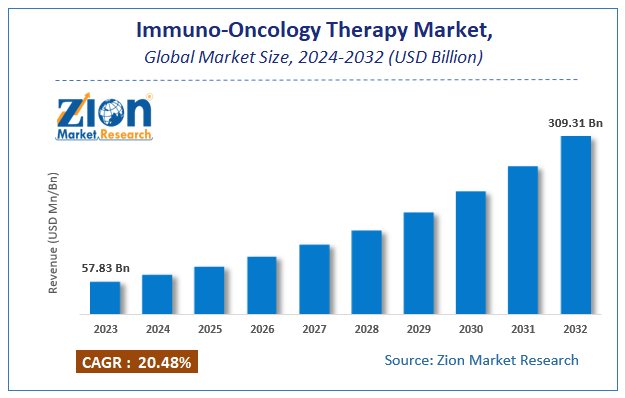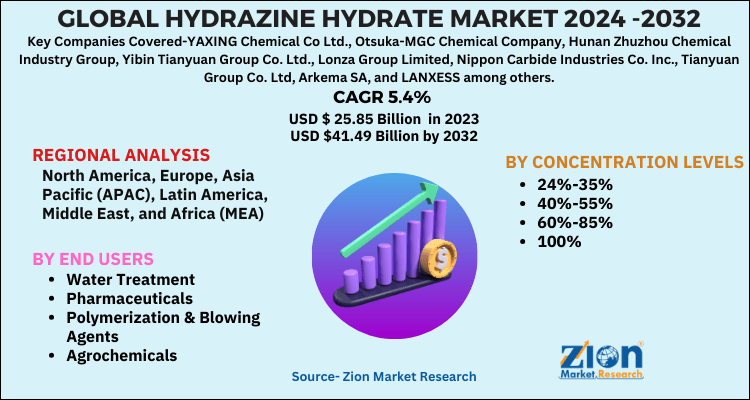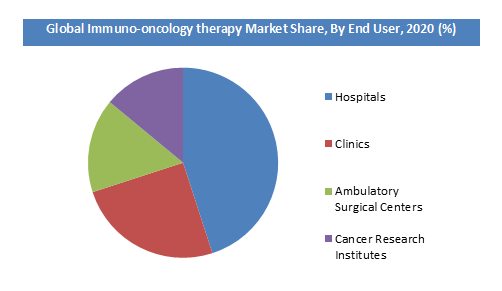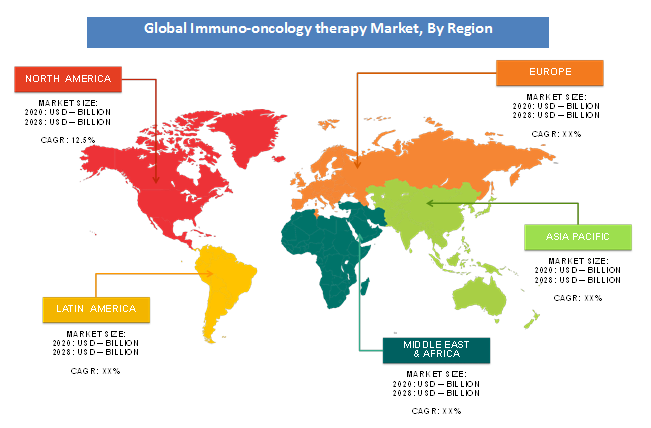Immuno-Oncology Therapy Market Size, Share, Trends, Growth and Forecast 2032

Immuno-Oncology Therapy Market By Therapy Type (Monoclonal Antibodies, Immune Checkpoint Inhibitors, Immune System Modulators, Cancer Vaccines, and Others), Therapeutic Area (Lung Cancer, Colorectal Cancer, Breast Cancer, Prostate Cancer, Melanoma, Blood Cancer, and Others Cancers), By End-user ( Hospitals, Clinics, Ambulatory Surgical Centers (ASCs), and Cancer Research Institutes) Global Industry Perspective, Comprehensive Analysis and Forecast, 2024-2032
| Market Size in 2023 | Market Forecast in 2032 | CAGR (in %) | Base Year |
|---|---|---|---|
| USD 57.83 Billion | USD 309.31 Billion | 20.48% | 2023 |
Immuno-Oncology Therapy Market Insights
Zion Market Research has published a report on the global Immuno-Oncology Therapy Market, estimating its value at USD 57.83 Billion in 2023, with projections indicating that it will reach USD 309.31 Billion by 2032. The market is expected to expand at a compound annual growth rate (CAGR) of 20.48% over the forecast period 2024-2032.
The report explores the factors fueling market growth, the hitches that could hamper this expansion, and the opportunities that may arise in the Immuno-Oncology Therapy Market industry. Additionally, it offers a detailed analysis of how these elements will affect market demand dynamics and market performance throughout the forecast period.
Market Overview
Immuno-oncology or cancer immunotherapy also called as biologic therapy, is a type of cancer treatment that boosts the body's natural defenses to fight cancer. It uses substances made by the body or in a laboratory to improve or restore immune system function. The number of deaths occurring due to cancer is increasing every year and has therefore forced government bodies to take initiatives for the improvement of the health conditions of people, by investing heavily in research and development and enabling innovation and advancements in technology to offer improved treatments. Healthcare providers are focusing on improving treatments and reduction in recurrence of cancer post-chemotherapy. This has pushed the growth of the immuno-oncology therapy market globally.
The major reason for decline in market during pandemic outbreak was decrease in patient volume in hospitals, owing to rescheduling and delaying of procedures for safety reasons. Furthermore, delays happened after careful review of patient history and if feasible, healthcare providers rescheduled endoscopic procedures to minimize risk of getting exposed to COVID-19 during hospital visits. All these factors negatively impacted the Immuno-oncology therapy market in 2020.
The next generation of drugs to treat cancer involves stimulating a person’s own immune system to selectively attack cancer cells while keeping normal cells unaffected, or delivering certain immune system components in order to inhibit the spread of cancer effectively. One of the hallmarks of certain types of cancers is the suppression of the body's immune system, rendering it unable to fight the disease. These therapies have shown great promise in several clinical trials as well as in patients currently being treated. The technological advancements are helping the growth of immuno-oncology therapy market. The biotechnology and pharmaceutical companies are striving to launch new and most effective therapies in the market.
The key factors that drive the growth of immuno-oncology market include rise in incidence & prevalence of cancer, technological advancements in treatment therapies, increase in number of R&D for the treatment of cancer, and specificity & effectiveness of cancer immunotherapy for the treatment of wide range of cancers such as lung cancer, breast cancer, skin cancer, and others. In addition, the rise in healthcare expenditure and healthcare insurance are expected to fuel the market growth during the forecast period. However, shortage of experienced healthcare professionals and lack of awareness among the population restricts market growth.
Growth Factors
Rising R&D in cancer immunotherapy is resulting in the introduction of advanced treatment options that are more effective and efficient. A paradigm shift from traditional chemotherapies to immunotherapies is propelling the overall market growth. Introduction of new drugs has resulted in an increase in the competitive rivalry. Immuno modulatory drugs, such as thalidomide, lenalidomide, and pomalidomide, were the best treatment options available in the past few years. Introduction of newer drug classes, such as monoclonal antibodies and HDAC inhibitors, designed to target receptors related to multiple myeloma, is expected to initiate newer trends in the market.
Ongoing studies on similar drugs designed to minimize side effects are expected to propel the market for these drug classes in the immuno-oncology therapy market.
Immuno-Oncology Therapy Market: Report Scope
| Report Attributes | Report Details |
|---|---|
| Report Name | Immuno-Oncology Therapy Market |
| Market Size in 2023 | USD 57.83 Billion |
| Market Forecast in 2032 | USD 309.31 Billion |
| Growth Rate | CAGR of 20.48% |
| Number of Pages | 140 |
| Key Companies Covered | Amgen, Inc., AstraZeneca Plc., Bristol-Myers Squibb Company, Eli-Lilly and Company, F.Hoffmann-La Roche Ltd., GlaxoSmithKline Plc., Janssen Biotech, Inc., Merck and Co., Novartis AG, Pfizer, Inc., Sanofi, Spectrum Pharmaceuticals and Takeda Pharmaceuticals among others |
| Segments Covered | By Therapy Type, By Therapeutic Area, By End-user and By Region |
| Regions Covered | North America, Europe, Asia Pacific (APAC), Latin America, Middle East, and Africa (MEA) |
| Base Year | 2023 |
| Historical Year | 2018 to 2022 |
| Forecast Year | 2024 - 2032 |
| Customization Scope | Avail customized purchase options to meet your exact research needs. Request For Customization |
Segment Analysis Preview
The immuno-oncology therapy market is segmented on the basis of therapy type into monoclonal antibodies, immune checkpoint inhibitors, immune system modulators, cancer vaccines and others. Immune checkpoint inhibitors are further segmented into PD1/ PDL1 and CTLA-4. Monoclonal antibodies segment is expected to grow at the fastest rate in the global market over the forecast period.
Based on the therapeutic area, the market is segmented into lung cancer, colorectal cancer, breast cancer, prostate cancer, melanoma, blood cancer and other cancers. Breast cancer segment is expected to grow at the fastest rate in the global market over the forecast period.
Hospitals, clinics, ambulatory surgical centers and cancer research institutes are the key end-user segments of the global immuno-oncology therapy market. The hospital's segment dominated the market in terms of revenue in 2020.
Over the last few years, North America and Europe have been the major contributors in the global immuno-oncology therapy market due to their reputation as a suitable place for research and development. The market for cancer immunotherapy has a huge demand in both region and is expected to grow in coming future. However, the global population witnessed an alarming surge in diagnosed cancer cases. For instance, according to GLOBOCAN, 14.1 million new cancer cases were diagnosed worldwide in 2012. According to WHO, the growth in cancer incidence is expected to increase by 70% over the next two decades with 22 million new cancer cases. Cancer is highly prevalent in lower and middle-income countries as they lack suitable healthcare infrastructure to effectively combat the condition. For instance, according to GLOBOCAN, 57% of 14.1 million new cancer patients diagnosed worldwide in 2012 were from less developed regions. Similarly, 65% of the total worldwide death related to cancer was reported from less developed regions.
Region Analysis Preview
North America, Europe, Asia-Pacific, Latin America and Middle East & Africa are key regional segments of global immuno-oncology therapy market. North America is anticipated to remain the leading region over the forecast period. Rising incidence of the disease, increasing ease of access to modern therapeutics coupled with expanding geriatric population is propelling the market in this region. On the other hand, factors, such as challenges in clinical trials, coupled with higher costs and rapidly changing reimbursement policies, are impeding the growth of the market in this region. The Asia Pacific is anticipated to show a very high, favorable growth rate in cancer immunotherapy adoption. Rising incidence of the disease and, in turn, rising mortality rate is propelling demand for immunotherapy in the region. Moreover, the presence of market players with major investments in the market, such as AstraZeneca and Pfizer, Inc., is boosting the market in the Asia Pacific.
Key Market Players & Competitive Landscape
The major players operating in the immuno-oncology therapy market are-
- Amgen
- AstraZeneca Plc.
- Bristol-Myers Squibb Company
- Eli-Lilly and Company
- F.Hoffmann-La Roche Ltd.
- GlaxoSmithKline Plc.
- Janssen Biotech
- Merck and Co.
- Novartis AG
- Pfizer
- Sanofi
- Spectrum Pharmaceuticals
- Takeda Pharmaceuticals among others.
The global Immuno-oncology therapy market is segmented as follows:
By Therapy Type
- Monoclonal Antibodies
- Immune Checkpoint Inhibitors
- PD1/ PDL1
- CTLA-4
- Immune System Modulators
- Cancer Vaccines
- Others
By Therapeutic Area
- Lung Cancer
- Colorectal Cancer
- Breast Cancer
- Prostate Cancer
- Melanoma
- Blood Cancer
- Other Cancers
By End-user
- Hospitals
- Clinics
- Ambulatory Surgical Centers (ASC’s)
- Cancer Research Institutes
By Region
- North America
- The U.S.
- Canada
- Europe
- France
- The UK
- Spain
- Germany
- Italy
- Rest of Europe
- Asia Pacific
- China
- Japan
- India
- South Korea
- Southeast Asia
- Rest of Asia Pacific
- Latin America
- Brazil
- Mexico
- Rest of Latin America
- Middle East & Africa
- GCC
- South Africa
- Rest of Middle East & Africa
Table Of Content
Methodology
FrequentlyAsked Questions
Immuno-Oncology Therapy Market market size valued at US$ 57.83 Billion in 2023
Immuno-Oncology Therapy Market market size valued at US$ 57.83 Billion in 2023, set to reach US$ 309.31 Billion by 2032 at a CAGR of about 20.48% from 2024 to 2032
Some of the key factors driving the global Immuno-oncology therapy market growth are rising R&D in cancer immunotherapy and a paradigm shift from traditional chemotherapies to immunotherapies.
North America is anticipated to remain the leading region over the forecast period. Rising incidence of the disease, increasing ease of access to modern therapeutics coupled with expanding geriatric population is propelling the market in this region.
The major players operating in the immuno-oncology therapy market are Amgen, Inc., AstraZeneca Plc., Bristol-Myers Squibb Company, Eli-Lilly and Company, F.Hoffmann-La Roche Ltd., GlaxoSmithKline Plc., Janssen Biotech, Inc., Merck and Co., Novartis AG, Pfizer, Inc., Sanofi, Spectrum Pharmaceuticals and Takeda Pharmaceuticals among others.
RelatedNews
HappyClients
Zion Market Research
Tel: +1 (302) 444-0166
USA/Canada Toll Free No.+1 (855) 465-4651
3rd Floor,
Mrunal Paradise, Opp Maharaja Hotel,
Pimple Gurav, Pune 411061,
Maharashtra, India
Phone No +91 7768 006 007, +91 7768 006 008
US OFFICE NO +1 (302) 444-0166
US/CAN TOLL FREE +1 (855) 465-4651
Email: sales@zionmarketresearch.com
We have secured system to process your transaction.
Our support available to help you 24 hours a day, five days a week.
Monday - Friday: 9AM - 6PM
Saturday - Sunday: Closed









